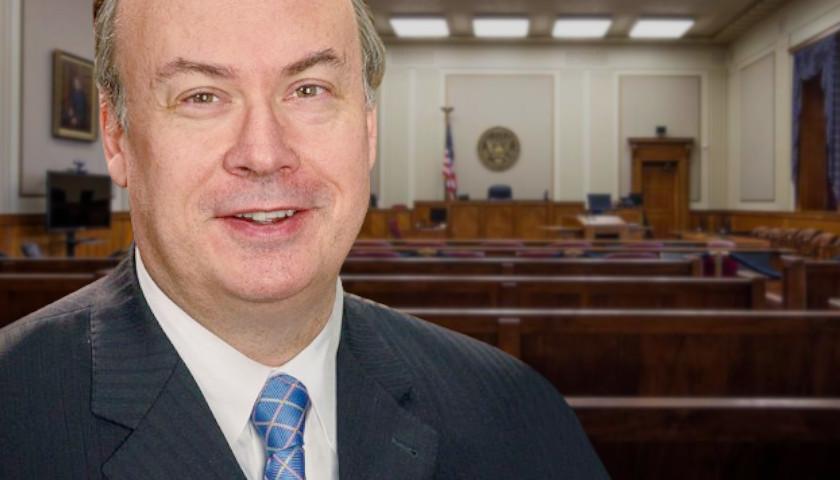Presidential-elect Donald Trump’s former DOJ official, Jeffrey Clark, is appealing a recommendation to suspend his law license over his work for then-President Trump addressing 2020 election irregularities. A three-member committee of the District of Columbia Board on Professional Responsibility found on August 1 that he breached attorneys’ ethics rules by drafting a letter that was never sent to Georgia officials advising them of their options for handling the 2020 election problems.
Clark first filed a Petition for Review with the District of Columbia Court of Appeals on August 7, requesting consideration of his interlocutory appeals. Interlocutory appeals are appeals conducted while other proceedings are still ongoing.
The new brief appealing the recommendation was filed with the District of Columbia Court of Appeals Board on Professional Responsibility (BPR) on October 28. That agency will determine whether to accept the committee’s disciplinary recommendation.
The brief began, “Stripped to its essentials and shorn of the partisan politics that drives it, this case is about the duty that attorneys owe to a client who rejects their advice because he questions their diligence, competence, and loyalty.”
It explained, “The very first paragraph of ODC’s Opening Brief concedes that, at all times relevant to ODC’s Charges, President Donald J. Trump sought, and received in his official capacity, legal advice and counsel about alleged 2020 federal election ‘irregularities’ from at least three attorneys employed by United States DOJ: Acting Attorney General Jeffrey Rosen, Principal Associate Deputy Attorney General Richard Donoghue, and Respondent, Assistant Attorney General Jeffrey B. Clark.”
The brief pointed out that even the bar’s attorneys, known as the Office of Disciplinary Counsel (ODC), did “not dispute that [the Charges] regarding the Justice Department involve Trump’s ‘use of official power,’ and thus ‘plainly implicate Trump’s conclusive and preclusive authority’ to consult with any Justice Department attorney to seek answers to his questions.”
Clark discussed how Trump was not pleased with two of the attorneys he spoke with about the election irregularities, Rosen and Donoghue, yet the bar did not discipline them. Clark cited the bar rule and the Constitution, which requires that attorneys for the president “shall abide by [the President’s] decisions concerning the objectives of representation.”
“Up to a point, two of these three attorneys did precisely that,” the brief argued. “But only Clark adhered to the Rules at all times and in all respects.” In contrast, “Messrs. Rosen, Donoghue, and Philbin violated Rule 1.6(a) not only by “reveal[ing the President’s] ‘confidence[s] and secret[s] … to the disadvantage of [Trump and the Office of President] [but they did so] for the [their own] advantage …’ and that of his political opponents.” That rule prohibits attorneys from revealing confidences of their clients.
Clark said the ODC and the committee are violating the disciplinary rules themselves because they are “ignoring” the very rules they are sworn to enforce.
Much of the brief refuted the committee’s findings that there were no irregularities in Georgia’s election. “Fulton County did not do any absentee ballots signature verification at all, but counted 146,029 absentee ballots anyway, Clark said.
The brief refuted multiple statements made by the committee twisting the facts in order to assert that Clark made false statements. For example, the committee claimed that Clark said in his draft letter that two sets of certified electors were sent from Georgia to Washington D.C. However, Clark said that only the Democratic electors were certified.
Clark’s suggestions to deal with the election irregularities were based on the Ligon Report, which cited chain of custody of ballot issues, absentee ballot problems, and more. The Ligon Report was a transcript from a Georgia Senate hearing held on December 3, 2020, named after Judiciary Committee Chairman William Ligon.
Clark pointed out numerous legal errors by the committee, such as not allowing any evidence from him regarding findings of election irregularities after January 3, 2021. “We were not allowed to present multiple expert and fact witnesses who would have given additional powerful and persuasive evidence of these and other significant irregularities in the November 2020 election in Georgia that vindicate Mr. Clark’s call for additional investigation,” he said.
The brief summarized, “If the BPR recommends discipline in this case, Clark will thus become the first lawyer in U.S. history to be disciplined because he followed the Rules of Professional Conduct that govern cases where attorneys and clients disagree on a colorable legal, but controversial, proposed course of action.”
The brief said “taking into account Clark’s unquestioned high motives, his lack of record, his distinguished career and all comparable cases, this Board should not accept the committee’s recommendation. At most, the Board should recommend a de minimis sanction, such as a private admonition that Clark be cautioned in the future always to be mindful of the need to qualify his statements.”
After the BPR’s decision, Clark can appeal that to the D.C. Court of Appeals. The pleadings in Clark’s case and those to disbar Rudy Giuliani and other Trump attorneys are located here. Clark is also a defendant in Fulton County District Attorney Fanni Willis’s RICO prosecution. He was considered a possible unindicted co-conspirator in Special Counsel Jack Smith’s election interference case against Trump, but he was removed from that case in August. His GiveSendGo legal defense fund has raised $132,486 of the $500,000 requested.
While some state bars around the country continue to discipline conservative election attorneys, some have begun backing off. In Arizona, after the Arizona Supreme Court held that election attorneys could not be disciplined for bringing election challenges, the State Bar of Arizona’s disciplinary judge ruled that she was not going to discipline Kari Lake’s attorneys, Kurt Olsen and Andrew Parker, citing the court’s decision.
– – –
Rachel Alexander is a reporter at The Arizona Sun Times and The Star News Network. Follow Rachel on Twitter / X. Email tips to [email protected].








